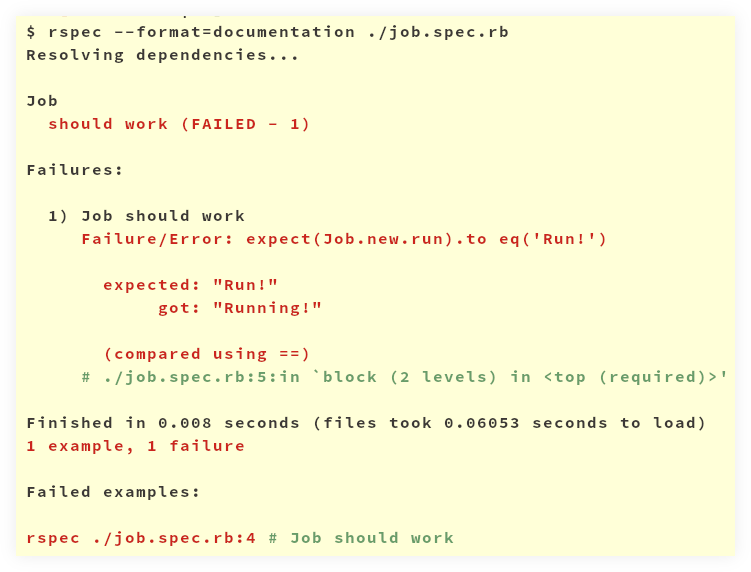RSpec
Getting Started
Simplest Approach
Install rspec:
$ rvm install rspecThen, if you have ruby specs like this one:
require_relative 'job'
describe Job do
it 'should work' do
expect(Job.new.run).to eq('Run!')
end
end|
Observe we do not need to |
Simply run:
$ rspec --format=documentation ./job.spec.rb
Update the implementation of Job#run to satisfy the test and run it again.

|
We can replace excerpt from rspec --help
|
Autorun
Sometimes when studying algorithms or doing some code algorithm and data structure challenges, it may be useful to simply have the tests on the same file as the implementation code itself.
|
First saw this approach used in the (free online) book How to Design Programs and the (free) courses UBCx: How to Code: Simple Data and UBCx: How to Code: Complex Data by Gregor Kiczales which are based on that awesome book. |
With ruby and rspec, we can do it with this approach:
require 'rspec/autorun'
class Calc
class << self
def add(x, y)
x + y
end
end
end
describe 'Calc.add' do
it 'should add two numbers' do
expect(Calc.add(-1, 1)).to eq(0)
end
endThen run with ruby (not with rspec):
$ ruby ./add.rb
Note by default rspec uses the progress (dots) output.
Because we are using rspec’s autorun feature and we run the tests by using the ruby add.rb (instead of rspec add.rb), there is no way to pass rspec options on the command line like rspec --format documentation add.rb.
Fortunatelly, rspec can read options from the .rspec config file:
--color
--format documentationThen it will show the test descriptions instead of simply the dots.

Assert STDOUT output
We want to assert output to STDOUT:
it 'should work' do
expect { puts 'Aayla Secura' }.to output(/secura/i).to_stdout
endWith some class method that outputs to STDOUT:
describe PlainTextFormatter do
it 'should output report title' do
report = Report.new(PlainTextFormatter.new)
expect do
report.output
end.to output(/===== Nostromo Report =====/).to_stdout
end
it 'should should output report body content' do
report = Report.new(PlainTextFormatter.new)
lines_to_match = [
'This is Ripley, last survivor of the Nostromo.',
'Signing off.'
].join("\n")
expect { report.output }.to output(/#{lines_to_match}/).to_stdout
end
end